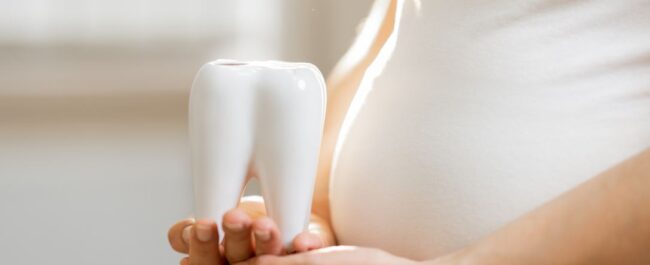How Pregnancy Affects Oral Health
Navigating Your Oral Health Journey During Pregnancy
Pregnancy is a beautiful journey filled with excitement and anticipation, but it also brings unique challenges, particularly regarding oral health. Hormonal fluctuations, dietary changes, and increased healthcare needs make it essential for expectant mothers to prioritize their dental care. Understanding these changes can help mothers-to-be maintain a healthy smile and set a solid foundation for their baby’s health.
At Reflections Dental Oakville, we care for families throughout their life stages. If you’re expecting, be sure to prioritize your whole health, including oral health. We’re honoured to be there on your journey of life!
Hormonal Changes and Their Effects
During pregnancy, a woman’s body undergoes significant hormonal changes that can affect oral health. Here’s how these changes can manifest:
1. Increased Risk of Gum Disease
The surge in hormones, particularly progesterone and estrogen, can lead to increased blood flow to the gums, making them more sensitive and prone to inflammation. This can result in:
- Pregnancy Gingivitis: This common condition typically occurs in the second trimester. Symptoms include swollen, red gums that bleed easily, especially when brushing or flossing. If left untreated, gingivitis can lead to more serious issues.
- Periodontitis: If gingivitis progresses, it can develop into periodontitis, a more severe form of gum disease that can lead to tooth loss. Studies have also linked periodontitis to low birth weight and preterm births, making it crucial for pregnant women to monitor their gum health closely.
2. Morning Sickness and Its Impact on Oral Health
Morning sickness, characterized by nausea and vomiting, is a common experience during the first trimester. This can significantly impact oral health:
- Acid Exposure: Frequent vomiting can expose teeth to stomach acid, eroding enamel and increasing the risk of cavities and sensitivity. Enamel erosion can lead to long-term damage if not addressed.
- Nutritional Challenges: Nausea may lead to a reduced appetite or aversions to certain foods, potentially resulting in nutritional deficiencies that can negatively affect oral health. A balanced diet is crucial for both the mother and the developing baby.
3. Changes in Saliva Production
Pregnancy can also alter saliva production, leading to:
- Dry Mouth (Xerostomia): A decrease in saliva can lead to discomfort and a higher risk of cavities. Saliva is vital for neutralizing acids and washing away food particles, making it essential for oral health.
- Changes in Taste Sensations: Many pregnant women report altered taste, which can influence dietary choices and preferences, impacting nutritional intake. This can sometimes lead to cravings for non-nutritive foods, which may affect oral health.
Maintaining Oral Health During Pregnancy
Taking proactive steps can help expectant mothers maintain optimal oral health. Here are some effective strategies:
1. Schedule Regular Dental Visits
Regular dental checkups are essential during pregnancy. Your dentist can:
- Monitor for Signs of Gum Disease: Early detection of gum disease can lead to more effective treatment and better outcomes for both mother and baby.
- Provide Safe Treatments: Dentists can offer guidance on safe dental care during pregnancy and perform necessary treatments while considering the health of the mother and fetus.
2. Practice Good Oral Hygiene
Establishing a robust oral hygiene routine is crucial for combating the challenges posed by pregnancy. Here are some tips:
- Brush Twice a Day: Use fluoride toothpaste to effectively remove plaque and reduce the risk of cavities and gum disease. If nausea is a problem, try brushing at different times to find what feels best.
- Floss Daily: Flossing helps remove food particles and plaque from between teeth, where toothbrushes can’t reach. This is especially important for pregnant women who may be more susceptible to gum disease.
- Use an Antimicrobial Mouthwash: Consider using a mouthwash designed to fight bacteria and promote gum health, ensuring it’s alcohol-free. This can provide an additional layer of protection against gum disease.
3. Make Healthy Dietary Choices
Nutrition plays a vital role in oral health during pregnancy. Focus on:
- Whole Foods: Incorporate a variety of fruits, vegetables, whole grains, lean proteins, and healthy fats into your diet to provide essential nutrients for you and your baby.
- Stay Hydrated: Drinking plenty of water is crucial for maintaining saliva production, which is vital for oral health. Staying hydrated also helps alleviate symptoms of morning sickness.
- Limit Sugar and Caffeine: Reducing sugar intake can help lower the risk of cavities, while excessive caffeine can increase anxiety and disrupt sleep.
4. Address Dental Issues Promptly
If you experience any dental issues, such as bleeding gums, tooth pain, or sensitivity, address them promptly. Ignoring these symptoms can lead to more serious problems down the line. Consult your dentist to discuss any concerns you may have regarding your oral health during pregnancy.
Empowering Your Oral Health Journey
Pregnancy is a time of significant change, but prioritizing oral health can lead to positive outcomes for both mother and baby. By understanding the effects of pregnancy on oral health and implementing healthy habits, expectant mothers can ensure a healthier smile and promote overall well-being.
Prioritize Your Smile for a Healthier Tomorrow
Taking care of your oral health during pregnancy is not just beneficial for you; it also sets a foundation for your baby’s health. Embrace these changes, and let your dental care journey support your pregnancy. A healthy smile today leads to a healthy future for both you and your little one!


